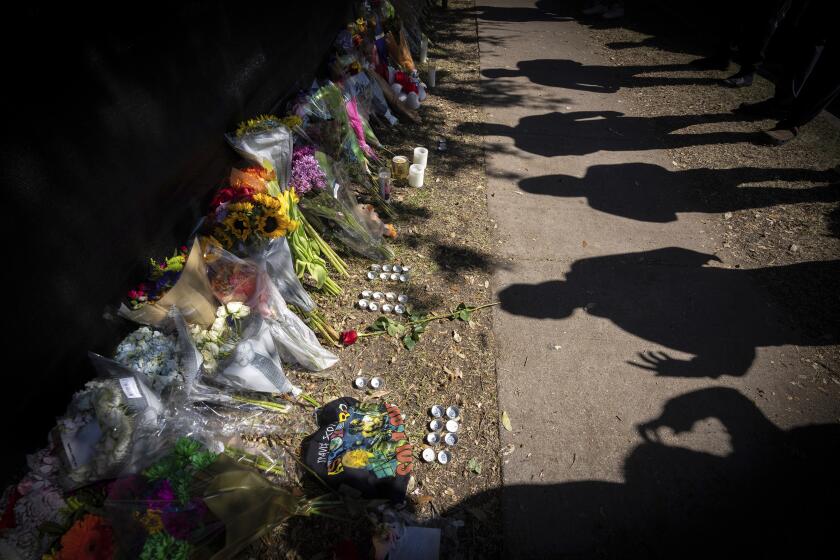Fighting for a Life : A mother refuses to let a rare disease claim her daughter. She has organized other patients’ families, raised money and brought attention to the little-known malady.
When Sandra Cruz’s baby daughter was diagnosed with an extremely rare blood disorder that would almost certainly stunt her growth and shorten her life, Cruz felt terribly alone.
“I thought she was the only one in the world to have it,” Cruz said.
She wasn’t far wrong. There are only 237 known cases of Diamond-Blackfan anemia in the United States and Canada, doctors said. Patients with the genetic disease, for which there is no cure, cannot produce the red blood cells that deliver oxygen to the body’s cells.
Cruz, of Baldwin Park, was disturbed by the lack of information available about the illness and how little research was being done to find a cure or better treatments. The isolation made her feel “powerless,” she said. “You feel frightened beyond your reach.”
But Cruz is determined to change that, for her daughter, now 3, and others.
Two years ago, Cruz tracked down other patients around the country and started the Diamond-Blackfan Foundation, a nonprofit organization whose goal is to raise funds for research and increase awareness about the disorder.
She called local hematologists, eventually finding a doctor in New York who was interested in setting up a registry and gave her names of other patients who wanted to start a network. She contacted the National Organization for Rare Disorders, a clearinghouse for rare diseases, and a coalition of disease organizations that gave her inspiration.
Her foundation, run from her home, has sponsored a five-mile walkathon, held bake sales, carwashes and sent letters to family and friends seeking donations. The organization produced an information booklet on the disease and publishes a newsletter. Through the network, parents are able to share their problems with others who can relate.
The foundation has also awarded a $30,000 grant to start a patient registry at Mt. Sinai Medical Center in New York.
Cruz is seeking unofficial sponsors for her and her husband, Ruben, and two others as they walk and run in the Los Angeles Marathon on Sunday. Any money raised will go to research.
Cruz’s accomplishments have come while she is also working as a supervisor for the county’s Department of Children’s Services.
Her daughter, also named Sandra, was born March 28, 1992, a full-term baby weighing less than four pounds. Because she had so few red blood cells, doctors had to give her a blood transfusion less than an hour after she was born.
By the time she was 2 months old, she had had three blood transfusions. “She was in and out of the hospital,” Cruz said. “I didn’t know what was going on.” Then, Sandra was diagnosed with Diamond-Blackfan anemia.
The cause of the disease, first identified in the 1930s, is unknown. Many born with the illness don’t live past age 25 because of complications caused by it or the side effects of the treatments, doctors said. In addition to being small in stature, some patients have abnormalities in the upper lips and thumbs.
Young Sandra’s doctor, Eric Kawaoka, said a minimal dose of steroids has stimulated her body to produce red blood cells.
The danger, he said, is that higher doses over a number of years cause patients to develop problems with blood pressure, decreased calcium in the bones or cataracts.
Patients who don’t respond to steroids have to get blood transfusions every three to six weeks. That can lead to organ damage and failure because of iron overload, he said. A bone marrow transplant is another option.
Meanwhile, Cruz said keeping up with young Sandra is a “roller coaster.” She also has two other daughters, Monique, 6, and Marcy, 15.
On one recent evening, Sandra, pale with sandy brown hair, laughed as she watched a favorite video, “Aladdin.” She chatted mostly in Spanish as she played with Monique, an ice cream mustache over her sometimes mischievous grin.
*
Although the girl can be fine for several days at a time, the drugs often make her hyper. “She’s too crazy,” Cruz said, adding that she literally jumps all over the room--off the television set, then off a table. Other times, “she gets moody and cranky--she can’t help it.”
Cruz acknowledges that she sometimes gets burned out. But, “if we don’t do it as parents,” she said of organizing fund-raising efforts, “nobody’s going to do it. That’s what keeps me going.”
Dr. David Nathan, a noted hematologist in Boston, has been studying Diamond-Blackfan anemia for 30 years. “It’s a very difficult problem, but I’m not gloomy about it,” he said.
Neither is Cruz.
“I know I’m not crazy,” Cruz said, noting she doesn’t expect a miracle cure right away. “But my daughter is [only] 4 years old,” she said, shrugging hopefully.
(BEGIN TEXT OF INFOBOX / INFOGRAPHIC)
The Beat
Today’s centerpiece focuses on a woman who started a support group for patients with a rare blood disorder and their relatives. If you would like more information on this or other rare diseases, call the Diamond-Blackfan Anemia Foundation, (818) 856-0683 or the National Organization for Rare Disorders, (203) 746-6518.
More to Read
Start your day right
Sign up for Essential California for news, features and recommendations from the L.A. Times and beyond in your inbox six days a week.
You may occasionally receive promotional content from the Los Angeles Times.





